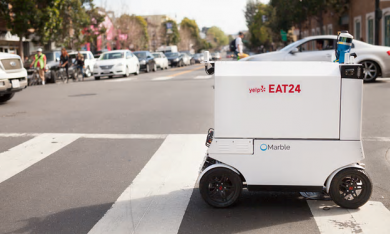San Francisco sours on rampant delivery robots: 'Not every innovation is great'
Lawmakers pass regulations to cut down on delivery robots as pedestrians tire of sharing sidewalks with ‘aggressively entrepreneurial wet dreams’
n something of a reversal for San Francisco, a city that has served as a petri dish for disruptive innovations in recent years, lawmakers this week passed strict regulations to reduce the number of delivery robots that technology startups have introduced to the city’s sidewalks.
“Not every innovation is all that great for society,” said the San Francisco supervisor Norman Yee, who authored the legislation. “If we don’t value our society, if we don’t value getting the chance to go the store without being run over by a robot … what is happening?”
Yee believes that his legislation is the “first and most restrictive” of its kind. Robot permits will be capped at three per company, and nine total at any given time for the entire city. The robots will now only be allowed to operate within certain industrial neighborhoods, on streets with 6ft-wide sidewalks, and must be accompanied by a human chaperone at all times.
It’s a far cry from other jurisdictions, such as Washington DC, Virginia, Idaho and San Francisco’s neighboring Redwood City, where lawmakers have acted to legalize sidewalk robots.
But in San Francisco, delivery robots have quietly taken to the sidewalks of over the past year. Companies including Marble and Starship are developing “robots as a service” business models, whereby food delivery apps contract with the robot companies to perform their deliveries.
At scale, the robots could significantly cut down on delivery vehicles (and labor costs), but they also take up space on sidewalks, where bicycles, Segways, and sitting or lying humans are already banned. Since taking on the issue, Yee said that his office had become something of a repository for photographs taken by angry residents of the robots clogging the sidewalks amid baby strollers, bus stops, street vendors, and pedestrians.

14. Dezember 2017
AUTOMAT VOR ORT: KONFERENZ AUTOMATICAR 2020
Am 16. September findet der Fachkongress AUTOMATICAR zum 2. Mal änlässlich der ...
»weiterlesenAUTOMAT vor Ort: Konferenz AUTOMATICAR
Am 12. April fand das erste Mal die von der Mobilitätsakademie des TCS organisierte ...
»weiterlesenAutomat vor Ort: EPTA Conference 2017
EPTA Conference 2017 „Shaping the Future of Mobility“ Luzern, Verkehrshaus, Mittwoch, 8. ...
»weiterlesenAuto-mat vor Ort: Automatische Shuttlebusse tpf
Am 22. September war www.auto-mat.ch live vor Ort, als die ersten beiden automatischen ...
»weiterlesen


